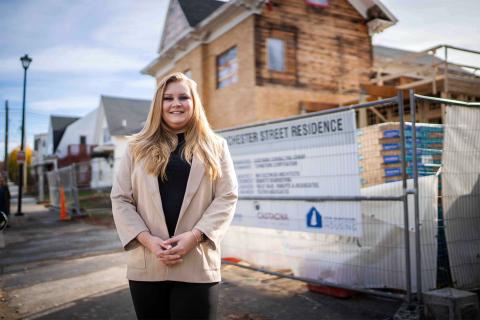Planning With a Purpose
Cassie Mullen '16
Addressing NH's Housing Crisis
Learn More
Cassie Mullen ’16 and I met for her interview in Manchester’s Restoration Café — an appropriate spot for talking with an alumna whose work is strongly tied to the concept of restoration: restoring buildings into safe, habitable homes, restoring peoples’ lives and dignity and restoring communities marred by rising housing costs, substance abuse and homelessness.
We’re about a quarter mile from one of the projects Mullen is working on for her employer, New Hampshire Housing, an organization that provides financing and other support for affordable housing in the state. She has worked there since September 2021 as a program manager of the Multifamily Supportive Housing program, part of the Multifamily Housing Division.
The project near the café will provide housing and on-site support for people experiencing mental health issues. Mullen’s job includes shepherding developers’ applications through the underwriting process and managing funding disbursements during construction. Along with mental health housing, she also works on housing projects for domestic violence victims, people dealing with substance use disorder, individuals with disabilities, families with a family member who has a disability and homeless individuals.
“In New Hampshire, we’re in a significant housing crisis. Everything is expensive, and people are getting priced out.”
“In New Hampshire, we’re in a significant housing crisis. Everything is expensive, and people are getting priced out,” Mullen says. “People must move away, or they’re living in unstable conditions, or they’re homeless. Our mission at NH Housing is to create affordable, safe housing for everybody.”
Mullen, who is from New Boston, graduated from the University of New Hampshire in 2016 with a degree in community and environmental planning (CEP). Even in high school, she knew she wanted to work with communities to better the lives of the people who lived in them, but she didn’t know that a major like CEP existed until she came to UNH.
“We have students doing every facet of planning — from housing and transportation planning to energy and environmental conservation,” says Mary Friedman, professor and program coordinator. “Students are doing internships and taking jobs in communities and regional planning commissions throughout New Hampshire, as well as in other states. It is very exciting to have all these Wildcats doing important work to create more sustainable communities.”
In Mullen’s junior year, Professor Friedman connected her with an internship opportunity at the Nashua Regional Planning Commission (NRPC). The experience led to a job offer after graduation.”
“Everyone in the community and environmental planning major really cared and wanted us to succeed,” she recalls. “When I entered the workforce, I already had many of the skills I needed to be successful. And for a time when I was working at the planning commission, everyone who graduated from CEP with me was working for a regional planning commission in the state.”
During her six years at the NRPC, Mullen worked with 13 communities in the greater Nashua area, assisting their planning boards with things like site and subdivision plan reviews, housing needs assessments, regulations and regulation amendments and surveys.
A volunteer advanced EMT for the New Boston Fire Department, Mullen is particularly glad to be working in her home state. Thanks to her background and training at UNH, she says, she’s also been helping the department in its efforts to replace its station by explaining planning and zoning rules and laws and approval processes.

“I think it’s really important to give back to where you came from. I grew up in a small town and everyone was volunteering, and that’s kind of how everything ran. Growing up in that environment nurtures a real connection to the place you came from.”
“I think it’s really important to give back to where you came from,” says Mullen. “I grew up in a small town and everyone was volunteering, and that’s kind of how everything ran. Growing up in that environment nurtures a real connection to the place you came from.”